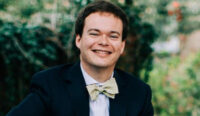The Faith of an Autistic Man
It was an unlikely connection. A literal, logical person, challenged by basic communication, and an unseen spirit, who communicates tlrrough the Word. Yet I reached out to God, and he reached out to me. We both answered the other’s call.
As an autistic person, I struggle to make connections. I did not communicate much as a young child and only barely as an adolescent. Even now, my thoughts exist independent of language. My mind undergoes a vast translation process, back and forth, to re late to the human world.
Yet the Christian faith spoke to me through one word: love. I often feel as if, by relying on only a single word, God designed this message for people like me. There is no complicated work to interpret that message. You are loved by your Creator. You are commanded to love others and also to love yourself.
It frequently surprises people that my faith is based entirely on logic and reason. It has no emotional base. Many may wonder how that squares with the message of love. But to me, it comes down to the principle of mutual recognition: H you believe in a Creator, then you believe that the Creator knows his own handiwork. You believe that each of us has a place, has equal value, and fully belongs in this world. There is not one correct path to life or to God. Mine may be unusual, but it can still be strong.
I first contemplated,the Christian faith when I was in high school and began engaging more with the outside world. Beyond autism, I have a metabolic condition and cerebral palsy. The limits placed on me by my disabilities were a daily reminder of my own brokenness. The only part of my body that was not negatively impacted was my mind. And I used it to come to a fuller understanding of God.
I could choose to be defined by my struggles-the problems and inabilities that shape my life-or I could develop strategies to overcome or live with them. My perspective matured when) realized that everyone struggles, and I can relate better to others who are struggling. And through God giving me such a strong and direct struggle, I had a more clear-cut choice of how to respond.
For example, I have much more trouble with human relationships than most people. From family to friends to
acquaintances to strangers, the degree of difficulty only in creases. Often, I don’t fully comprehend what goes on in someone else’s mind, what comes out, and how to relate my own mind to it. One way I have tried to adapt is through prayer.
I have taught myself to focus my prayers around my interactions with other people and what is happening in their lives. Because my brain processes information differently, it tends to “deprioritize” human information. I can have trouble remembering a face or even something someone confided in me. So, each morning, I pray to override my subconscious. I actively pray for people and for my interactions with them. I pray for them to receive comfort. I pray to make the lives of others a priority in my own mind. I pray to remember.
Another “strength” I have found is in my unconventional approach to emotion. The stereotypical view of autistic people holds that we “lack emotion.” It’s truer to say I operate in a very different emotional register. But I am not sure the rest of the world handles its strong emotions so well. I see all kinds of disabling emotions-despair, fear, irrational anger, hatred, paranoia-being used to devalue others and declare them un worthy or inferior. America’s public discourse seems to con sist of a never-ending series of brief monologues, typed out on social media and intended to wound others and aggrandize the self. I see so much anger, and I wonder if the world might benefit from an “autistic circuit breaker” to stop this emotional overload. Might we not all be more empathetic with more caring and less emotional wounding?
Emotion can even derail faith. Disappointment, pain and frustration can lead some to tum away from God and from each other. But this can be exactly the moment when logical faith provides the greatest stability and the strongest roots to grasp.
In many religions, not just Christianity, a guiding message is that the weak display surprising sources of strength. Many of Jesus’ teachings revolve around the value of the outcast, the stranger, the leper and the suffering. I wonder what kind of hidden strengths those people had and how they were able to better the lives of those around them and bring light where they are. Maybe God’s love showed them how, as it has showed me how.
Jory Fleming is author of “How to Be Human: An Autistic Man’s Guide to Life” (Simon & Schuster, 2021)

